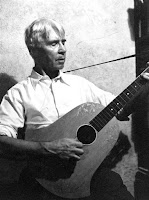Click Elvis performing at his big "comeback special" (NBC TV, 1968) to hear him do his first record, "That's All Right, Mama."
"That's All Right, Mama" almost didn't get recorded. During an uneventful recording session at Sun Studios on the evening of July 5, 1954, Presley, Scotty Moore (guitar), and Bill Black (upright bass) were taking a break between recordings when Presley started fooling around with an up-tempo version of Arthur Crudup's song "That's All Right, Mama." Black began joining in on the bass, and soon Moore came in on guitar. Producer Sam Phillips, surprised by this sudden upbeat atmosphere, asked the three of them to start again so he could record it.
Upon finishing the recording session, according to Scotty Moore, Bill Black remarked, "Damn. Get that on the radio and they'll run us out of town."
Click the image of Elvis reaching out to fans (the Mississippi-Alabama Dairy Show, Tupelo, Mississippi, 1956) to hear, "I Want You, I Need You, I Love You."
Click Elvis-Las Vegas to see an an amazing performance of "Suspicious Minds/Caught in a Trap." Elvis seems wired to the drum beat.
 |
This "clickable" opens to Elvis on the Ed
Sullivan Show, singing his biggest hit ever, "Don't Be Cruel." (The
Jordanaires backing him.) What makes the 1956 chart performance of “Don’t Be
Cruel” so phenomenal is that it faced stiff competition from Elvis’s own “Hound
Dog” on the flip side. His biggest hit spent 27 weeks in the Top 100, 16 weeks
in the top 10, and 7 weeks at #1.
|
 |
What was Elvis' second biggest hit? "All Shook Up." In 1957 it stayed on Billboard's Top 100 for seven months! Eight of those weeks it was Number One! And, no wonder! How can you go wrong with lyrics like,
"A well'a bless my soul
What'sa wrong with me?
I'm itchin' like a man in a fuzzy tree ..."
|














































